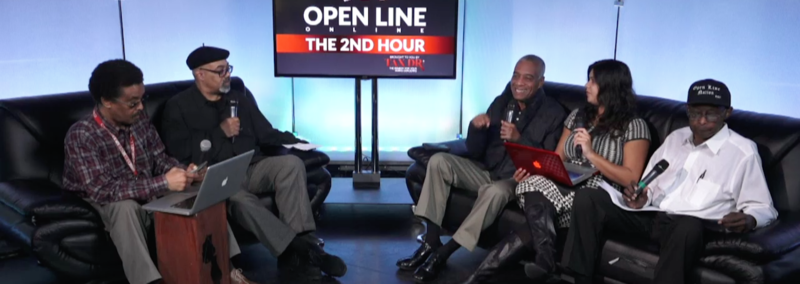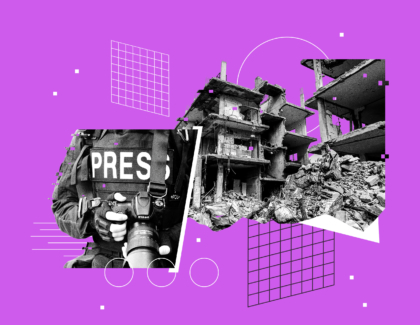Sign up for the daily CJR newsletter.
The Sunday morning radio show began on a light note. Sports occupied the first few minutes of a one-hour block, before the hosts shifted their focus to a schizophrenic Bronx woman killed by police. Then the powerhouse voices of Bob Slade and Bob Pickett, recognized and respected by millions of East-coast listeners, guided the discussion toward the 2016 election.
Slade sat back in his green leather varsity-like jacket as he introduced a segment appropriately titled “politricks.” “The presidential campaign is getting wackier by the minute,” Slade started off. They ridiculed Donald Trump’s antics at the final debate and the Al Smith dinner. They were just as critical of Hillary Clinton, pointing out the Clinton Foundation’s shady-appearing activities. Callers to the show, dubbed Open Line, chimed in to air their own frustrations with an overarching lack of truth that has characterized this campaign season.
Unlike conservative talk radio, and despite the fact most of its listeners are likely to vote for Democrats, partisanship is not the driving link among Open Line’s audience members, nor the program’s goals in discussing the election. Instead, it’s almost like a family–regardless of one’s political beliefs, everyone’s voice is heard. Slade and Pickett refer to callers and each other as brothers and sisters.
That sense of camaraderie, of shared life experiences and principles, ultimately make ethnic radio’s approach to political discussion unique. For many people of color, ethnic and community radio programs anchored by news and talk serve as an outlet to dissect issues plaguing their communities–ones often missed by mainstream media. The listener base is extremely loyal. The Clinton campaign has taken note and has turned to the air ways to channel her message directly to black and Hispanic talk-show listeners. Over the last few weeks, Clinton has participated in roughly 30 quick and breezy interviews including one with WBLS’ Steve Harvey Morning Show.
The dimly lit studio garnished with WBLS logos is tiny, but that has not stopped Open Line, which first aired in 1989, from influencing millions. The show has guided its listeners through many elections. Slade, creator of the program, discovered his love of radio after coming across the medium while working in some off-Broadway performances. He launched his radio career in 1971, and by 1980 he became a news director at a predecessor to WBLS.
The lack of serious talk shows for the black community troubled him, but ultimately inspired him to fill that void. As the show gained traction and became a staple on the weekly lineup, Slade eventually brought on two co-hosts–musician and producer James Mtume in 1994, and attorney Bob Pickett the following year. The trio would go on to host hundreds of shows together, before Mtume’s departure in 2013.
Abdul Hafeez Muhammad, New York representative for the Nation of Islam, was the guest during last month’s show, along with their executive producer Fatiyn Muhammad. With professional backgrounds in law, history, and activism, paired with their personal experiences, each one brought different strengths to the roundtable.
Keeping listeners informed while providing a platform for their voices to be heard is Open Line’s main goal, Pickett tells CJR. He notes that the varied viewpoints cover the multifaceted concerns of their listeners. This makes their debates and discussions even more valuable to the community, especially this election season.
An example of this from the livestream, Open Line Live the 2nd Hour, an exchange between reporter and freelance writer Nida Khan and media commentator Akili Buchanan who are frequent guests on the show:
Nida Khan: Clinton is much more hawkish, right? She’s much more hawkish than Obama, she’s much more hawkish than Trump himself.
Akili Buchanan: I’m not sure about that. I’m not sure about that
Nida Khan: And Why do you say that?
Akili Buchanan: Because I think finally he’ll be a puppet for uh Putin’s interest–but I’ll let you finish your point.
Nida Khan: And that’s sort of going back to the hawkish factor and what you said about Obama too, that’s always the conflict that people like me on the left have always had where internationally we’ve just continued the Bush doctrine … Domestically Clinton is absolutely better so I am going to vote for her, but internationally I think you are absolutely right Larry. Like on November 9th we have to hold her feet to the fire and hold her accountable.”
Akili Buchanan: And that’s the contradiction … we might oppose Obama on various issues, but then support him on others, but the bottom line is people on the left; the progressives, working class, people of color, the LGBT all of us who believe in progress and humanity have to be vigilant on all of these various issues.
Open Line and other programs like it play a crucial role in the communities they serve because they are a reflection of the community’s values. “Radio owes its existence to the very community it is serving because it is sustained by that community,” says Jehangir Khattak, a co-director at the Center for Community and Ethnic Media at CUNY Graduate School of Journalism.
Beyond just informing listeners via radio, all forms of ethnic media normally play an active role in the community by hosting events such as panels and programs to educate the audience. Chris Haynes, an associate professor of political scientist at the University of New Haven, says social media has also given the radio stations another tool for engagement with their target communities.
Although there are no quantitative studies on the direct link between ethnic radio and election results, voter turnout offers some insights. According to Nielsen, 66 percent of eligible African Americans voted in 2012–the highest turnout for any racial group. That number was 48 percent for Asian voters and 47 percent for Hispanic voters. The turnout for white voters that same year was 64 percent.
Haynes adds that it is a major misstep for either party to underestimate the influence of ethnic media. The shows welcome guest spots from candidates, no matter their party affiliation. “Failing to engage with ethnic communities can signal to these groups that the particular candidate or party does not care about them,” he says “This can leave votes on the table for candidates that do not engage in such efforts.”
Compared to mainstream outlets and nationally syndicated shows, their base is small. Open Line averages one million listeners per show, according to the producer. That has not stopped them from their stated goal of informing listeners and allowing them to be heard. They closed out the show again urging listeners to vote and giving out details on where to find polling information for New York, New Jersey, and Connecticut. “The power is in your hands,” Slade told listeners.
The Open Line crew ultimately knows their work is informing people and holding the powerful accountable, and that’s what motivates them every Sunday morning. “It’s heartbreaking to see what’s going on,” says Slade. “The media is not focusing on real issues like poverty, income, or minimum wage. People are sounding good, but not delivering on their promises.”
Has America ever needed a media defender more than now? Help us by joining CJR today.







